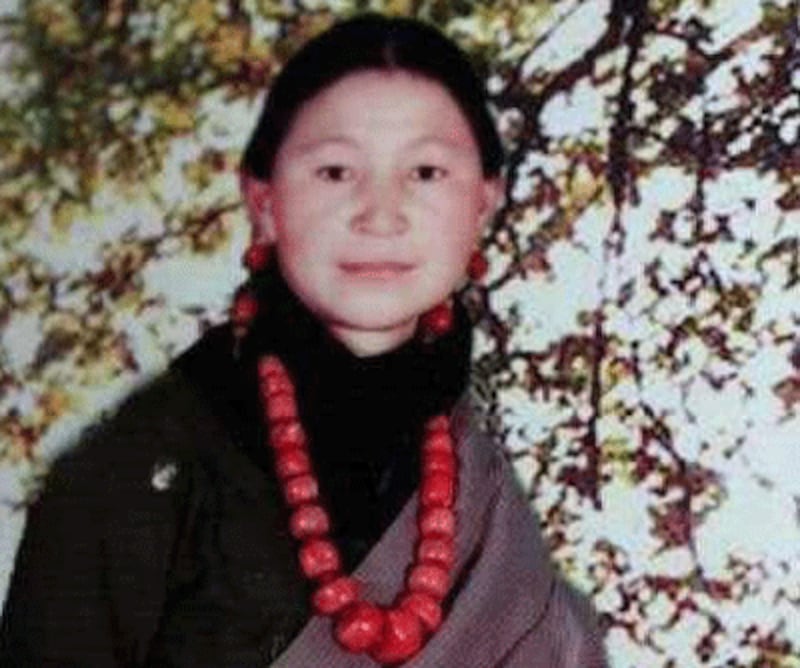Chinese security forces have detained three Tibetan monks from a monastery at which a woman self-immolated in protest against Chinese rule this week, triggering protests demanding their release, according to sources.
Tensions emerged around the Tso monastery in Gansu province amid reports that another self-immolator, a young monk, died in neighboring Sichuan’s Ngaba (in Chinese, Aba) Tibetan prefecture, on the same day he set himself on fire on Aug. 6.
The three monks were picked up by police on suspicion of sheltering Dolkar Tso, 26, a Tibetan mother of two who self-immolated near a stupa at the Tso monastery in the Kanlho (in Chinese, Gannan) prefecture on Tuesday. She died on the same day.
“Last night, at about 10:00 p.m. local time, Chinese police entered the Tso monastery and detained monks Choephel, Sherab, and Tsondru,” a local source told RFA on Wednesday, speaking on condition of anonymity.
“Tsondru was released this morning, but at around 5:00 a.m. Chinese police in about a dozen vehicles arrived and tried to detain 17 other monks suspected of bringing Dolkar Tso to the monastery.”
Monks and local residents then mobbed the police to demand the release of those detained, the source said.
“A large number of monks and laymen then gathered in front of the monastery’s prayer hall to demand that the monk Choephel be set free,” he said, adding, “They have sworn to continue their protest if Choephel is not released.”
Protest march halted

Also on Wednesday, at 1:30 p.m., about 300 monks left the large nearby monastery of Labrang Tashikyil to say prayers and offer condolences at Dolkar Tso’s family home, but were stopped by Chinese officials, the same source said.
“The officials threatened to take action against the monks and to confiscate their vehicles, but the monks left their vehicles and attempted to continue on foot to Dolkar Tso’s home,” he said.
“Staff from the monastery’s management committee came out to plead with them not to leave, and the monks then sat down in front of the gate of the Buddhist Dialectics School near the monastery and began to pray.”
“More monks have now begun to gather to join them in their prayers,” he said.
Dolkar Tso’s self-immolation on Tuesday brought to 46 the number of self-immolations by Tibetans challenging Beijing’s rule since the current wave of fiery protests began in February 2009, with almost all of the protests occurring in Tibetan-populated provinces in western China.
Monk dies of burns

A day earlier, monk Lobsang Tsultrim from the restive Kirti monastery in Ngaba (in Chinese, Aba) Tibetan prefecture died after setting himself on fire, sources said.
He succumbed to his burns at a hospital in Barkham (in Chinese, Ma’erkang) at around midnight that same day, Kanyag Tsering, a monk living at Kirti’s branch monastery in India, said, citing sources in the region.
“His body was then cremated by the Chinese and his ashes were handed over to his family,” Tsering said.
“On the night of Aug. 7, four monks from the Kirti monastery re-cremated Lobsang Tsultrim’s ashes at a site near the monastery,” he said, adding that monastery classmates are now selling his belongings.
During his protest, Lobsang Tsultrim shouted slogans calling for the return of exiled spiritual leader the Dalai Lama and the exiled abbot of his monastery, freedom for Tibet, and the re-opening of a Kirti monastery school closed by Chinese authorities in 2008, sources said.
He took about 10 steps before falling to the ground, and Chinese police then extinguished the fire and shoved the badly burned monk into a vehicle, driving him to the Ngaba county hospital, Tsering said.
After half an hour, he was transferred to Barkham Hospital, where he later died.
Lobsang Tsultrim left a final testament, details of which are unknown, but Chinese authorities have threatened a 10-year prison term for anyone transmitting this outside the Kirti area, Tsering said.
Reported by Lumbum Tashi and Rigdhen Dolma for RFA’s Tibetan service. Translated by Rigdhen Dolma. Written in English by Richard Finney.
